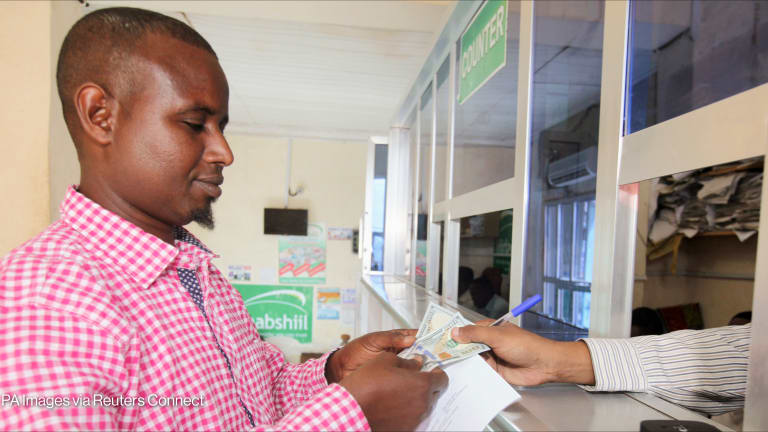
WASHINGTON — In response to COVID-19, private sector companies have donated cash, supplies, and equipment and set their research capacity toward developing diagnostics and vaccines. A new platform launched this week seeks to help the response move from largely siloed operations to a more coordinated effort.
The World Economic Forum launched the COVID Action Platform “as a mechanism and conduit for business partners to be engaged in the response in a more meaningful fashion,” Arnaud Bernaert, head of Shaping the Future of Health and HealthCare at WEF, told Devex.
“I would hope that a number of initiatives that will be channeled by the [COVID Action] platform will look into where offers can actually enable a better response from health systems in underserved countries.”
— Arnaud Bernaert, head of Shaping the Future of Health and HealthCare, WEFThe platform will bring together companies and help organize initiatives to close key gaps in the response. Action depends on what issues companies want to take on, but may include supply chain continuity, innovation in medical countermeasures, and protecting health care employees.
More on COVID-19:
► Iran, NKorea, Syria: How sanctions are hindering coronavirus response
► Coronavirus: WHO inches closer to declaring a pandemic
► PAHO to deploy extra COVID-19 support to weaker regional health systems
COVID-19 has presented a unique challenge for corporations, many of which have experience responding to natural disasters, because it continues to evolve, and “a lot of the more obvious steps you see after a natural disaster aren’t so obvious yet,” said Marc DeCourcey, senior vice president at the U.S. Chamber of Commerce Foundation.
A lot of the resources mobilized by the private sector early on went to China, with much of those funds funneled through a few nonprofits, including Give2Asia and the Chinese Red Cross.
Donations flowed to those few organizations in part because of the Chinese government’s rules around corporate donations, DeCourcey said. Where the private sector directs their response efforts will change as the demands shift, and companies are also looking at how they can support communities where they work in countries that have not yet been hit hard by the virus, he added.
The business community wants to respond and is doing so in a few ways: It is working to protect employees, maintain continuity of operations, and is aiming to help others through manufacturing necessary products or supporting the communities where they operate, DeCourcey said.
While much of the response has been from large multinational corporations, some smaller businesses have engaged as well, though they often have less experience and fewer resources in managing such situations, he explained.
About 500 organizations — both existing partners and companies that have expressed interest in the response and have capabilities to mobilize or want to make better informed decisions — joined a call kicking off the WEF platform on Wednesday.
WEF will collect suggestions from companies on initiatives they may want to lead and once vetted help bring in other partners. It is looking to move quickly: “We count in hours, not even days and weeks,” Bernaert said.
The efforts to date have been siloed because it takes time for the private sector to get organized, and companies need a reliable information channel to guide decision-making and ensure business continuity, he added.
“Acting individually in silos can’t work, but acting in initiatives where people join forces and capabilities can have an effect,” Bernaert said.
From the start, the initiatives and collaborations organized through the platform will keep universal access, affordability, and health equity in mind, he said.
“I would hope that a number of initiatives that will be channeled by the platform will look into where offers can actually enable a better response from health systems in underserved countries,” Bernaert said, adding that there may be opportunities to educate health care workers or tech solutions that can protect health workers.
If therapeutics, vaccines, or new types of personal protective equipment become available, WEF would work to ensure that affordability and health equity are factored into the pricing, he said.
The Coalition for Epidemic Preparedness Innovations, which has so far committed nearly $24 million to COVID-19 vaccine development efforts in partnership with private companies, launched at the WEF annual meeting in 2017 and can serve as a model for collaborative private sector action today.
Similar efforts could be useful in developing therapeutics, or in understanding supply chain challenges and identifying regulatory obstacles, he said. While there is competition and commercial sensitivities, companies have shown a willingness to work together before, including on supply chains through the Pandemic Supply Chain Network, Bernaert said.
While WEF won’t manage any funds directly, it will evaluate where there are resource gaps and direct funding to those areas.
Search for articles
Most Read
- 1
- 2
- 3
- 4
- 5








